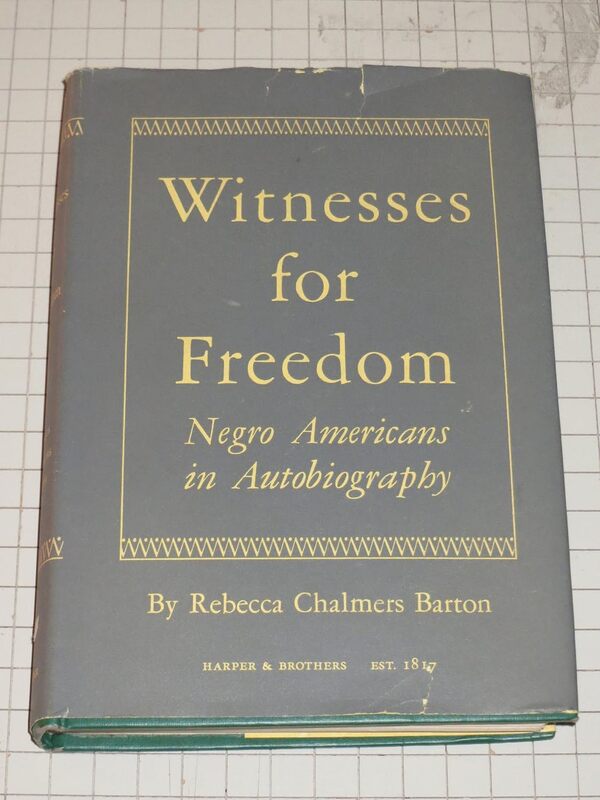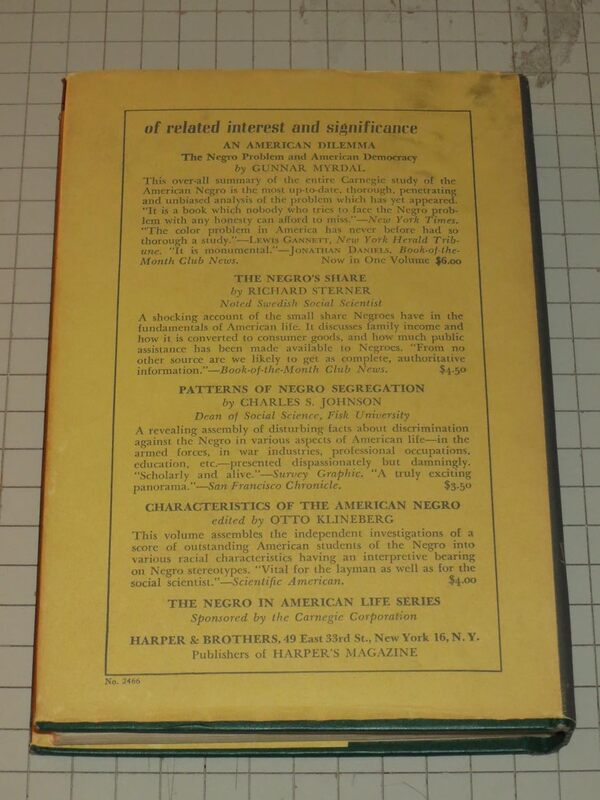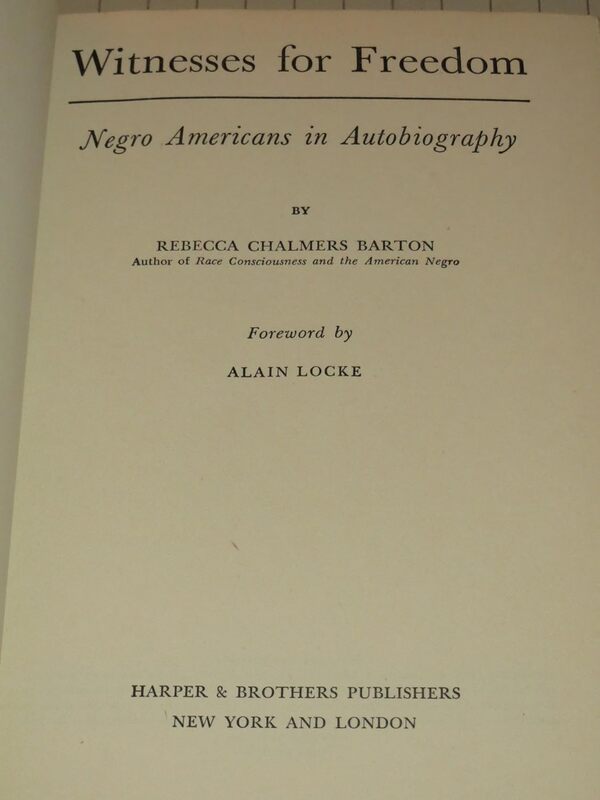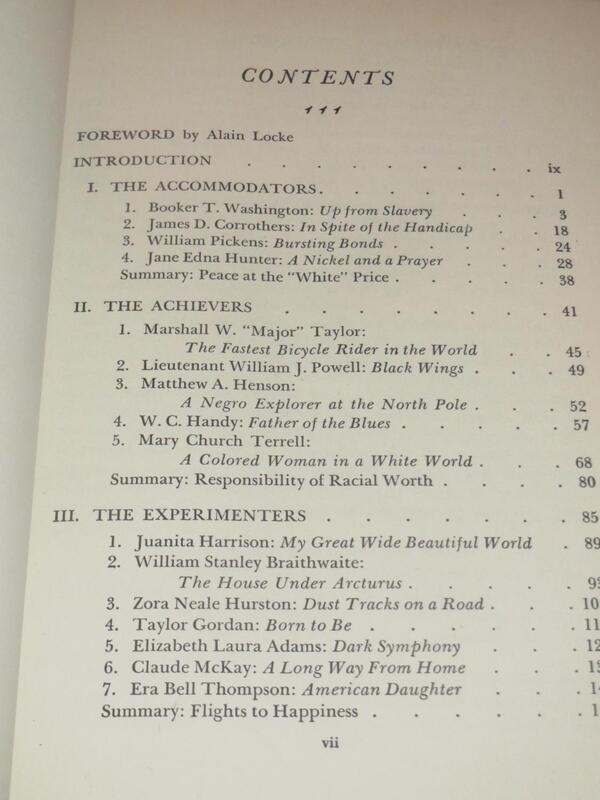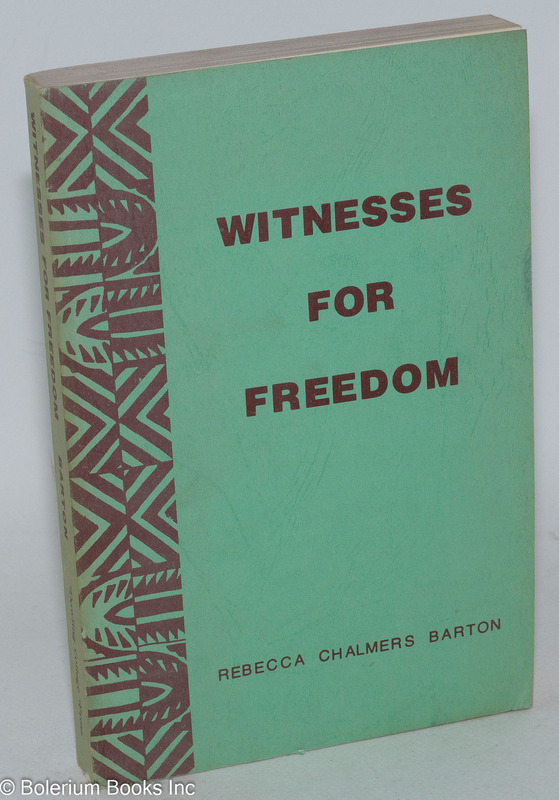Witnesses for Freedom: Negro Americans in Autobiography
Item
-
Title
-
Witnesses for Freedom: Negro Americans in Autobiography
-
This edition
-
"Witnesses for Freedom: Negro Americans in Autobiography". Ed. Rebecca Chalmers Barton. Foreword by Alain Locke. New York: Harper, 1948. xiii+294 pp.
-
Other editions, reprints, and translations
-
• Repr. Oakdale, NY: Dowling College Press, 1977. xiii+294 pp.
-
Table of contents
-
• Alain Locke / Foreword
• Rebecca Chalmers Barton / Introduction
I. The Accommodators
• Booker T. Washington / Up from Slavery
• James D. Carrothers / In Spite of the Handicap
• William Pickens / Bursting Bonds
• Jane Edna Hunter / A Nickel and a Prayer Summary: Peace at the "White" Price
II. The Achievers
• Marshall W. "Major" Taylor / The Fastest Bicycle Rider in the World
• Lieutenant William J. Powell / Black Wings
• Matthew A. Henson / A Negro Explorer at the North Pole
• W. C. Handy / Father of the Blues
• Mary Church Terrell / A Colored Woman in a White World
Summary: Responsibility of Racial Worth
III. The Experimenters
• Juanita Harrison / My Great Wide Beautiful World
• William Stanley Braithwaite / The House under the Arcturus
• Zora Neale Hurston / Dust Tracks on a Road
• Taylor Gordan / Born to Be
• Elizabeth Laura Adams / Dark Symphony
• Claude McKay / A Long Way from Home
• Era Bell Thomson / American Daughter
Summary: Flights to Happiness
IV. Protesters for a New Freedom
• Frederick Douglass / Life and Time of Frederick Douglass
• W. E. Burghardt Du Bois / Dusk of Dawn
• Angelo Herndon / Let Me Live
• Langston Hughes / The Big Sea
• James Weldon Johnson / Along This Way
• J. Saunders Redding / No Day of Triumph
• Richard Wright / Black Boy
Summary: Searchlight on Society
-
Reviews and notices of anthology
-
• "Books--Authors." "New York Times" 4 June 1948: B21.
"Harper will bring out on Tuesday 'Witnesses for Freedom: Negro Americans in Autobiography,' by Rebecca Chalmers Barton, a study of the life stories of twenty-three Negro Americans."
-
• Hirschl, Jessie. "Social Service Review" 23.3 (1949): 411-12.
-
• Masuoka, Jitsuichi. "American Journal of Sociology" 55.1 (1949): 112-13.
-
• Woodson, Carter G. "Journal of Negro History" 33.3 (1948): 366-68. [JSTOR]
"All of the new adherents to the crusade for brotherhood, while manifesting sufficient enthusiasm, do not have the proper understanding of the people whom they are trying to help. Some of their utterances and writings, therefore, do almost as much harm as good. The work under review belongs to this class" (367).
"In the first place, a writer easily goes astray in selecting as samples of the best thought and action of the Negro only those who have written autobiographies. . . . The strivings of the Negro race in America are not thereby set forth in the proper light, for some of the most successful workers for the advancement of their people are too modest to write accounts of their careers while the immodest and self-advertising resort to this method for selfish purposes. This tendency appears not only among Negroes but among all other people" (367).
"It is rare . . . that an author unintentionally produces a work which must inevitably result in a serious distortion of the minds of those who do not grasp the meaning of history and the role of the Negro in that drama. A few errors will expose the weaknesses of this book. For example, Booker T. Washington is mentioned among the 'Accommodators,' but why should he be grouped with James D. Corrothers who did not reach his level, or with William Pickens whose leadership was of a different type?" (367).
"The author, it must be conceded, was handicapped by lack of adequate materials. Negroes who have reflected the spirit of their people and have done much toward their development have been too reluctant to write their autobiographies and have left the field to be preempted by others, some of whom have done nothing worthwhile. A worker of the type of the author who must become acquainted with the Negro race chiefly through the inadequately written word is necessarily at a disadvantage. The lofty aim of the author is set forth in her 'Summaries' in which she undertakes to evaluate the philosophy of these workers as a guide to those now interested in intergroup and intercultural education. It is unfortunate that she has not as yet penetrated the mind of the Negro and therefore cannot properly interpret the race to others. By more study and increasing contact with this element of the population she may become equal to the task which she cannot now perform" (368).
-
Commentary on anthology
-
• James, Milton M. "Biographical Approach to Negro History." "Negro History Bulletin" 23.4 (1960): 74-75.
-
Item Number
-
A0604
